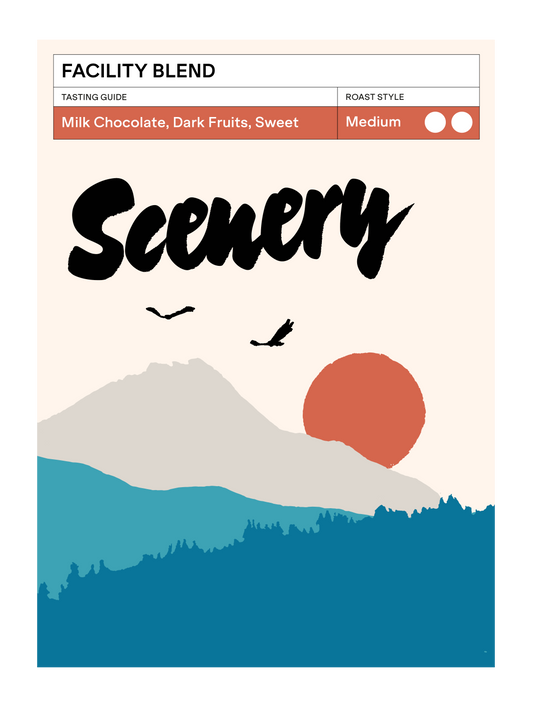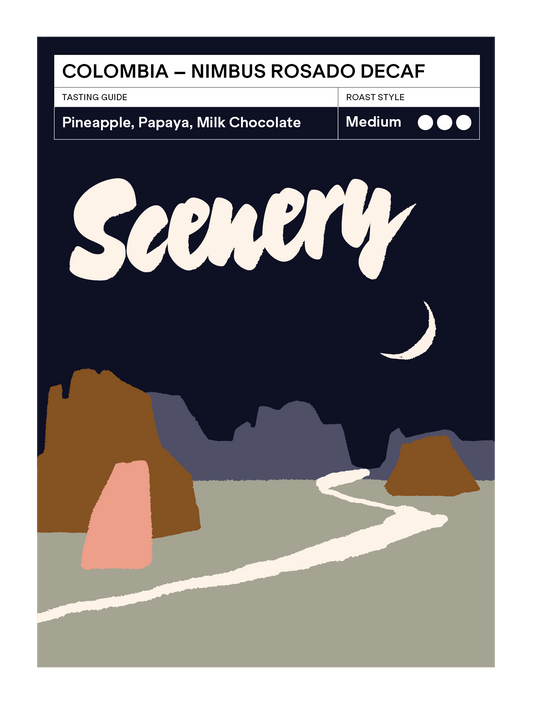Ture's brilliant anoxic lot ran from 04/09/24 to 13/11/24, with full classic Eth blueberry flavours alongside florals and the right amount of process-driven funk.
Ture Waji is the founder and MD of Sookoo coffee, and is nicknamed "the King of Guji" - considering the quality his stations bring to the table and the excellent roasters offer lists his green frequents, it's a nickname that's well earned.
This special prep was completed at the Suke station with cherries from smallholders in the Shoondhisa kebele, with an 86hr anoxic dry cherry ferment in grainpro, prior to drying on raised beds. We're stoked to offer this raucously jammy banger.
Brew Guide:
Best Brewed with: Filter or Turbo Espresso
This coffee has heaps of integrated process character and stands up well to a light roast - we’re pushing for the maximum aromatic complexity, trading some body & funk for cleaner, complex sweetness.
We recommend resting this coffee for 2-3 weeks before brewing.
Espresso: 18g in, 45g out, 25-30s, go faster and longer yield for a turbo-style shot with high clarity
This coffee works great at a 60g/L classic filter ratio.
We’re tasting: Process driven notes of papaya, berries and parma violet, in the cup rich blueberry pie (jammy with a buttery shortcrust sweetness), muscat grape, pineapple and mango. Winey, but in a good + integrated way.
Traceability:
Country of Origin: |
|
Region: |
|
Station: |
Suke Drying Station |
Producer: |
|
Variety: |
JARC 74110 & 74112 |
Elevation: |
|
Process: |
Anoxic Natural: Ripe cherries hand picked and sorted. |
Import Partner: |
Osito via Sookoo Coffee |
Harvest |
|
The Story
We’ve featured coffees from Ture Waji’s Sookoo coffee - we bought an out-of-season Bookkisa natural to run in an early version of facility. It’s testament to the excellent agronomy, processing and milling that a coffee that was over a year from landing (and nearly 2 from harvest!) was holding up incredibly well, and expressed the perfect flavours we needed for a more developed espresso roast.
When we set out to source Ethiopian coffee for this season, we were dead set on finding some great special preps. A change in Ethiopian government export regulations (likely related to the need to bring in more foreign currency from exports) set a minimum price floor for exported “anaerobic” naturals. This saw many importers shy away from bringing in the same lots we were keen on with the initial rounds of imports and early moving containers.
While some late harvest, late shipping lots have seen a bit more choice arrive in the offer lists of import partners we work with - this lot from Osito was one of the earliest available special preps we’d seen through our typical sourcing channels, and offered a great contrast to the other lots we’ve sourced, and even better yet it nailed the profile we were looking for.
The fact it was available earlier was a key factor in our decision making - as shipping earlier and spending less time in port, less time being transhipped around various hot ports as it made its way round the horn of Africa and through to the UK ensured there would be less time for logistics related quality drop. A thing we suspect not all late arrivals will be free from, and worth our swift move on this one.
While we went hard on picking ultra-clean and top-note dominated coffees from Eth this year, this lot is a polar opposite - bassy, loud, raucous and full-bore fruity funk.
This lot was processed at the Suke station in Shakiso, Guji. The cherry came from smallholders in the Shoondhisa kebele - and for the heads that know the profile this micro-region produces, you’ll see why this caught our eye. Famously known for exceptionally berry-dominant coffees, the extra processing step of holding the cherry in grain-pro (hermetically sealed, food-grade plastic bags used typically to transport green coffee) for 86 hours before drying just amplifies all the big bold natural notes we’re looking for. The warm climate, retained moisture from the cherries and low oxygen enviroment created inside the grain-pro promotes an entirely different microbial environment for fermentation, those altered communities and metabolic pathways creating complex flavour compounds and pre-cursors.
This initial intervention has significant results in the final cup even after the coffee is finished via “natural” drying, the environment shifting as the moisture leaves and yeast become dominant on the skins of the fruit. Done badly, a coffee like this picks up the rotten fruit character or as it’s more commonly known - bin juice. Executed well - papaya, blueberry pie and intensely complex, with all the baseline flavours of the micro-region serving as a foundation for additional flavours created through complex wild fermentation.

![[34] Ethiopia - Ture Waji Anoxic Natural [CROP 23/24 ARCHIVE]](http://scenery.coffee/cdn/shop/articles/ethiopia_ture_waji_shopify.png?v=1733128390&width=1100)


![Colombia - Villamaría Natural Decaf [25/26]](http://scenery.coffee/cdn/shop/files/colombia_villamaria_decaf_2526_shopify.png?v=1768578400&width=533)


![Mexico - Electrónicas Mazateca [25/26]](http://scenery.coffee/cdn/shop/files/mexico_electronicas_2526_shopify.png?v=1767970714&width=533)






![Colombia - Quebraditas Sidra Thermal Shock Washed [25/26]](http://scenery.coffee/cdn/shop/files/colombia_quebraditas_sidra_2526_shopify.png?v=1765544630&width=533)


